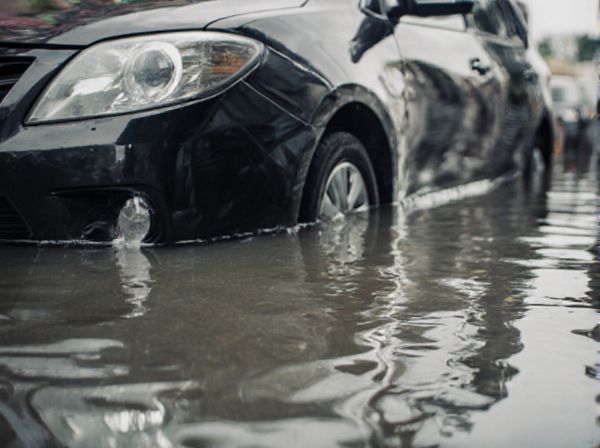
Photo illustration: Enhanced Flooded vs Standard Flooded
Enhanced Flooded Batteries (EFB) offer improved cycling stability and longer lifespan compared to Standard Flooded Batteries, making them ideal for vehicles with start-stop technology. Your vehicle will benefit from quicker recharge times and better resistance to deep discharges with EFB batteries. Standard Flooded Batteries provide reliable performance at a lower cost but lack the advanced durability and efficiency features of Enhanced Flooded options.
Table of Comparison
| Feature | Enhanced Flooded Battery (EFB) | Standard Flooded Battery (SFB) |
|---|---|---|
| Performance | Higher charge acceptance and better cycling ability | Basic performance, suitable for standard vehicles |
| Durability | Longer lifespan with improved resistance to deep discharge | Shorter lifespan, less resistant to deep discharge |
| Application | Start-stop systems, vehicles with higher electrical demands | Conventional vehicles with normal electrical loads |
| Maintenance | Low maintenance, reduced water loss | Requires regular maintenance and water refilling |
| Cost | Higher initial cost but better long-term value | Lower initial cost but shorter service life |
Introduction to Flooded Batteries
Flooded batteries, including Enhanced Flooded Batteries (EFB) and Standard Flooded Batteries (SFB), use a liquid electrolyte to store and deliver electrical energy. Enhanced Flooded Batteries offer improved charge acceptance and longer cycle life compared to Standard Flooded Batteries due to advanced plate design and optimized active material. These batteries are widely used in automotive applications for reliable starting power and energy support in stop-start systems.
Understanding Standard Flooded Batteries
Standard Flooded Batteries, also known as Lead-Acid batteries, use a liquid electrolyte to facilitate chemical reactions that generate power. These batteries are widely used in automotive and industrial applications due to their reliability and cost-effectiveness but require regular maintenance such as checking electrolyte levels and ensuring proper ventilation to prevent corrosion and overheating. Understanding the chemical composition and maintenance needs of Standard Flooded Batteries is essential for optimizing their lifespan and performance in comparison to Enhanced Flooded Batteries, which offer improved cycle life and better resistance to deep discharges.
What are Enhanced Flooded Batteries (EFB)?
Enhanced Flooded Batteries (EFB) are an advanced type of lead-acid battery designed to provide improved charge acceptance and longer cycle life compared to Standard Flooded Batteries (SFB). EFBs use a reinforced glass mat separator and thicker plates, allowing better cranking power and durability, especially in Start-Stop vehicle systems. These batteries deliver enhanced performance in high-demand applications, making them ideal for modern automotive and heavy-duty uses.
Key Differences Between Enhanced and Standard Flooded Batteries
Enhanced Flooded Batteries (EFB) offer improved charge acceptance and longer cycle life compared to Standard Flooded Batteries (SFB), making them better suited for start-stop vehicle systems. EFBs feature reinforced grids and thicker plates, which enhance durability and reduce sulfation under partial state of charge conditions. Standard Flooded Batteries are typically less expensive but provide lower performance in deep cycling and quicker capacity loss under heavy use.
Performance Comparison: EFB vs Standard Flooded Batteries
Enhanced Flooded Batteries (EFB) provide superior cycling durability and faster recharge capabilities compared to Standard Flooded Batteries, making them better suited for vehicles with high electrical demands and frequent start-stop cycles. EFB technology improves charge acceptance and deep cycle performance by incorporating advanced plate design and stronger grids, resulting in longer service life and improved reliability. Standard Flooded Batteries remain cost-effective but offer lower performance under deep discharge conditions and slower recovery times after heavy use.
Lifespan and Durability Factors
Enhanced Flooded Batteries (EFB) offer significantly improved lifespan and durability compared to Standard Flooded Batteries (SFB), typically lasting 30-50% longer under similar conditions. EFB technology incorporates reinforced plate structures and advanced electrolyte formulations, enhancing resistance to deep discharges and cyclic wear. These design enhancements result in superior performance in start-stop automotive applications, where frequent charge and discharge cycles demand greater battery robustness.
Applications and Use Cases for EFB and Standard Flooded Batteries
Enhanced Flooded Batteries (EFB) are primarily used in start-stop vehicles and light commercial applications where improved charge acceptance and durability are required to handle frequent engine restarts and deeper cycling. Standard Flooded Batteries are commonly utilized in conventional vehicles and backup power systems, providing reliable, cost-effective energy storage for everyday starting and general-purpose use. EFB batteries support energy recovery systems and short trips with high electrical load, while standard flooded batteries are well-suited for less demanding automotive and stationary power applications.
Maintenance Requirements: Enhanced vs Standard Flooded
Enhanced Flooded Batteries require less frequent maintenance compared to Standard Flooded Batteries due to improved water retention and reduced electrolyte loss. Standard Flooded Batteries demand regular electrolyte level checks and topping off with distilled water to prevent damage and maintain performance. The enhanced design reduces the risk of corrosion and extends overall battery lifespan, minimizing routine maintenance efforts.
Cost Considerations and Value Analysis
Enhanced Flooded Batteries (EFB) generally have a higher upfront cost compared to Standard Flooded Batteries (SFB) due to improved plate design and enhanced durability. EFBs offer better cycle life and performance under partial state of charge conditions, which can lead to long-term savings despite the initial investment. The value lies in reduced replacement frequency and improved reliability for applications subject to frequent cycling and deep discharges.
Choosing the Right Battery: Which One Suits Your Needs?
Enhanced Flooded Batteries (EFB) offer improved cycling performance and higher charge acceptance compared to Standard Flooded Batteries (SFB), making them ideal for vehicles with start-stop systems and frequent short trips. Standard Flooded Batteries provide reliable, cost-effective power for traditional combustion engine vehicles without extensive electrical demands. Selecting the right battery depends on your vehicle's technology, driving habits, and electrical load to ensure optimal performance and longevity.
 caratoz.com
caratoz.com